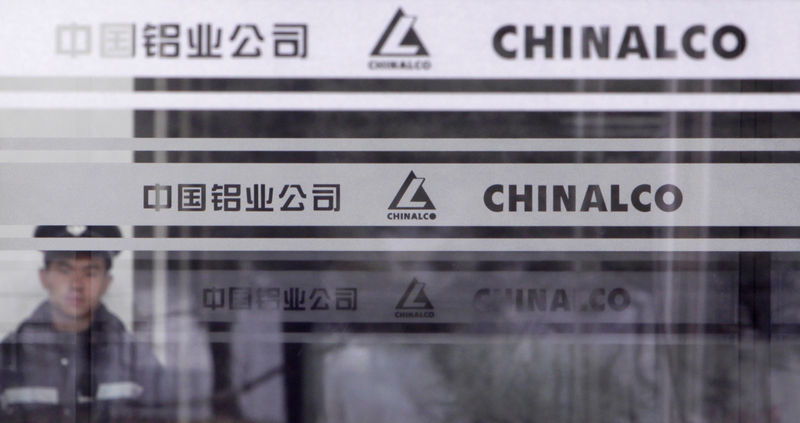By Tim Cocks
CONAKRY (Reuters) - Chinalco has asked Guinea to let it take over the whole of the troubled Simandou iron ore mine project, sources familiar with the matter say, as Beijing pursues a global strategy to secure key resources for its vast economy for decades to come.
Mired in legal disputes, located in Guinea's remote interior and being planned at a time of depressed world prices, the mine has nevertheless attracted intense interest from China, the world's biggest producer and consumer of steel.
The Chinese state-owned miner's written proposal for Simandou, one of the world's largest untapped resources of high-grade iron ore used to make steel, seeks more favourable terms than laid out by the poor West African country's mining code.
In the most important concession, the firm has suggested the code could be altered to let it acquire all four Simandou blocks without competing in a public tender, according to one of the sources, who declined to be named.
A spokesman for Chinalco had no comment on any aspect of its negotiations with Guinea, when asked about the project by Reuters.
In an interview with Reuters last week, Mines Minister Abdoulaye Magassouba declined to comment on Chinalco's proposal but said there was a possibility of it taking the whole concession.
"Everyone wants it all," he told Reuters. "Of course, they are free to express interest, but in the end we will make the decision on the basis of commercial negotiations."
LONG-STALLED PROJECT
In October, Rio Tinto (L:RIO) (AX:RIO) said it had sold its major stake in Simandou to Chinalco (HK:3668), a move many hoped would revive the long-stalled scheme.
In March Chinalco sent the government a draft agreement that included a proposal to take over blocks 1 and 2 before it starts developing 3 and 4, a source familiar with the matter told Reuters.
Blocks 1 and 2 are owned by Guinea but at the centre of litigation between it and Israeli billionaire Benny Steinmetz's BSGR.
Industry sources say Guinea has missed the iron ore supercycle, as huge Australian deposits will amply supply the world for many years.
That suggests Chinese interest in Simandou is part of a long-term strategy, driven more by concerns about control of resources than short-term shareholder value, the sources say.
Billions of tonnes of some of the world's highest grade iron ore lies under the remote forested hills of Simandou, but to transport it to Guinea's coast will cost $23 billion in infrastructure upgrades, according to government estimates.
That includes building 650 km (400 miles) of railway, 35 bridges, 24 km of tunnels and a deep-water seaport.
Guinea could cut the bill by going via Liberia, whose coast is closer. But Magassouba told Reuters this would never be acceptable to the government, which sees the trans-Guinean railway as important for national development.
A senior government negotiator, who also declined to be named, confirmed Chinalco was seeking to reunite the blocks.
But he said Guinea would only agree to hand them over if tough conditions were met, including lifting the production schedule above its current 100 million tonnes a year.
"Economically it makes sense to have one project, but we are not going to agree to this on just any condition," he said.
TANGLED HISTORY
A potential pitfall is Guinea's mining code, which states that "for blocks containing a known deposit, award will be made by a transparent and competitive tender". It also says the state must get 15 percent of any new concessions plus the right to buy another 20 percent.
Chinalco proposes Guinea amend whatever regulations it must to get the firm better terms than that and avoid a tender, the source familiar with the matter said.
The deal could still become snagged on disagreements over timing. With the current glut in iron ore, Chinalco has no reason to hurry.
"Guinea's interest is to move quickly. We are not sure Chinalco's plan is consistent with this goal," Ibrahima Kassory Fofana, presidential adviser on investment and public-private partnerships, told Reuters.
"I have indications that they won't start until 2025. That wouldn't be acceptable."
Rio Tinto (L:RIO) had the rights to all of Simandou until 2008, when then-President Lansana Conte stripped it of the northern half.
Steinmetz's BSGR bought it and then sold 51 percent to Brazil's Vale. However, an investigation by U.S., Guinean and European authorities resulted in a former BSGR associate being jailed for corruption and Guinea stripping BSGR and Vale of the permit in 2014.
BSGR denies all wrongdoing. The blocks it owned are now mired in a legal tussle between Rio, Guinea, BSGR and Vale.

Vale declined to comment.